Youth Mental Health Re-imagined
After a decade of rising suicide stats its time to create a 21st Century
mental health screener by combining technology and human wisdom.

Project Description
Family photo credit: #frontstepsprojectdarien @rtpictureworks Bambi Smith Riegel
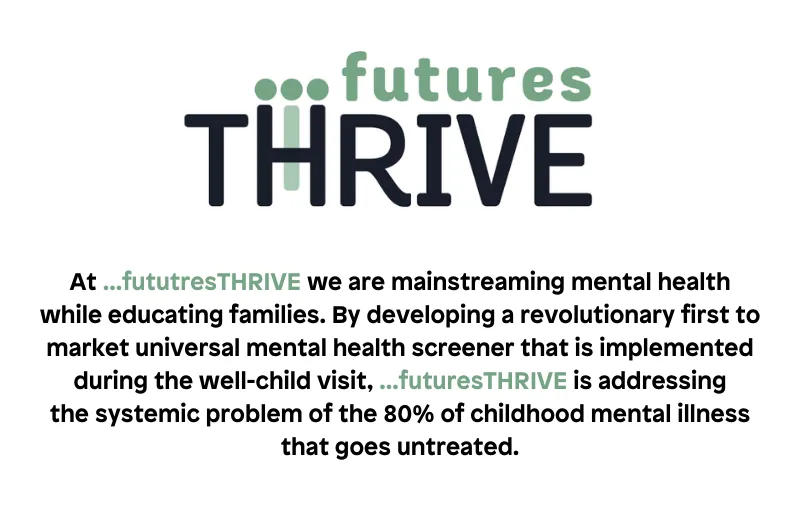
Your investment in a healthier future for our children will also benefit your child. A $15,000 investment would give you access to a world-renowned project as a participant. See more in the featured reward.
These inventment dollars will also open the door to matching investments through the state of CT and will develop both the Proof of Concept, used to pitch larger investors and Minimally Viable Product (MVP) for a suicide screener. Development can be completed by September.

Suicide is the second leading cause of death among youth aged 10 through 24. It’s a frightening statistic that is only getting worse; the rate of suicide among youth of this age group has grown by 56% in the past two decades. (Sources: Washington Post and PBS)
Countless mental health studies on youth confirm that our children are growing up with increased anxiety, depression, ADHD, and other mood disorders.
- According to the National Institutes of Health, nearly one-third of all adolescents aged 13 to 18 will experience an anxiety disorder
- Between 2005 and 2017, incidences of major depression among youth increased 52% between 2005 and 2017, and by 63% for young adults aged 18 to 25
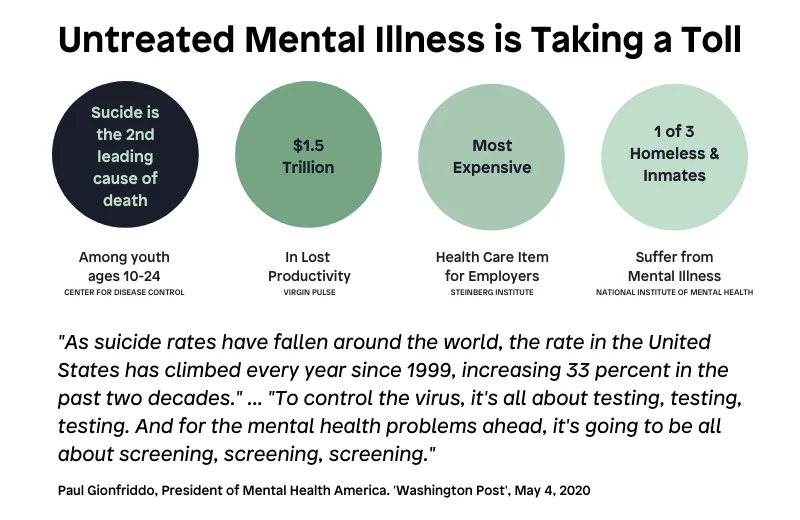
Unfortunately, today it takes an average of 10 years to properly diagnose a mental health condition and get treatment. The Centers for Disease Control and Prevention estimates that only 20% of youth suffering from a mental health disorder receive treatment. There are negative impacts from this delay or lack of treatment that can last a lifetime, including continued negative mental and physical health outcomes, a decrease in earning capacity, and a decrease in life expectancy of 10 – 20 years.
Despite these alarming trends, there has been no tangible improvement in the paper-based mental health screener provided at well-child visits to their pediatrician in over 10 years.
Current methods still have limitations like the lack of breadth and depth from traditional 5-point scales, human error, lack of automated tracking, time, and cost of current scoring systems.

...futuresTHRIVE has designed a revolutionary mental health screener that combines with the latest technology with wisdom and heart to provide pediatricians with an affordable, easy-to-use diagnostic tool.
Early intervention is the deciding factor in how much a person will suffer, how long the person with mental illness will live, how productive and successful a person will be, and how costly the ripple effects of unaddressed mental health concerns will have across the many sectors of a community. Given this reality ...futuresTHRIVE aims to identify signs as early as the get of 4 and reduce the incidence and severity of illness, thereby reducing the financial and emotional ripple effects.
The screening technology we are developing will be effective for children beginning at age 4, regardless of race or ethnicity, and will take into account both verbal answers as well as body language.
We are at the beginning of a three-phase development plan to get the …futuresTHRIVE screener into pediatrician’s offices throughout the country. We have made it through the first phase of the application process for a grant from the Small Business Innovation Research (SBIR) program and need to make progress on our proof of concept to be considered for a federal grant of up to $1.5 million.
Our proof of concept will include validating the question set which will be used in the screening tool. This is a critical first step for our technology and for changing the nature of youth mental health diagnostics.
Please consider an investment of any size. This is a large problem and we need a community of support to solve it.


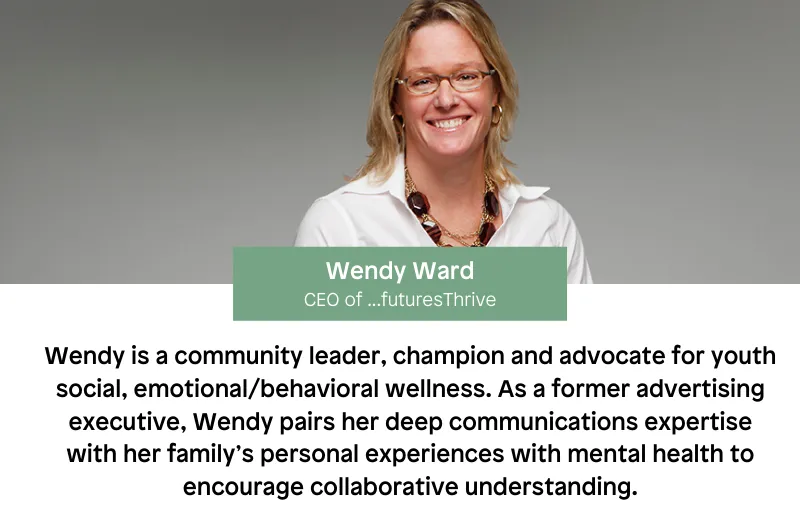
...futuresTHRIVE was born out of a personal mental health crisis that Wendy Ward lived through with her family. This propelled her to spend the last decade researching opportunities in the landscape of mental health and building a team to affect change so that no family has to suffer the devastating consequences she and her family experienced. While talking to entrepreneurs, health practitioners, and families, it became clear that despite the considerable press and societal panic, the crisis was worsening and barriers to treatment were growing.

Paula Prentis, LMSW, CWP
As a licensed social worker and certified wellness practitioner with a master's degree from NYU, Paula represents the clinical liaison for the team. Paula has published and presented extensively on youth mental health and identity development.
Rick Stevenson, PhD, Author
Rick has twelve feature films and hundreds of hours of television to his credit. He is the Founder of The School of Life Project. He holds a doctorate from Oxford University and a master’s degree from The London School of Economics.
Greg Wright, Director of AI Development, Design & Data Security
A graduate of the University of Washington, Greg is the co-inventor of StoryQ™ and a professional project manager who has overseen its development since 2010. He is a developer of patented information management systems and has a passion to change the landscape of mental health.
Max Losee, Director of Technology & StoryQ Development Lead
A graduate of the University of Utah, Max's tech development for social-purposed visionaries delivers revolutionary products that change lives. He has a background in product development and extensive experience working with youth.

Funding us today will allow us to develop a proof of concept, which we will use in the next phase of our application for The National Science Foundation. This money will also help us as a contender for institutional funding.
...futuresTHRIVE's new advancements in technology can provide:
- The nation’s largest mental health data set criteria
- First-ever personalized mental health baseline for youth
- The only high quality actionable data-driven results that do not eliminate the doctor
- First-ever individualized assessment screener designed for youth
- Fastest data processing on the market
- Revolutionary and new validation scale
- 21st-century method to reduce cultural barriers, human bias and clinician burden
- One combined screener for anxiety, depression, ADHD, emotion regulation capacities and disruptive behavior disorders


Updates
The Campaign FAQs
Frequently Asked Questions
What is the scope of the problem?
- Half of all mental health conditions have onset by age 14. Seventy-five percent of these conditions are present by age 24. (National Institute of Mental Health)
- Suicide is the second leading cause of death among youth ages 10–24. Ninety percent of suicide fatalities within this group had an underlying mental illness. (NIMH)
And if those numbers don’t cause you to pause, the newest data shows the suicide rate among children aged 10 through 14 has nearly tripled from 2007 to 2017, while the suicide rate among older teenagers has increased by 76 percent between 2007 and 2017. (CDC)
-
The average time from the onset of a mental health condition to intervention is 10 years. Untreated or minimally treated, our youth community is growing into an “unwell” adult population. Currently, there are approximately 44 million adults struggling with mental health conditions of whom 25% have co-occurring active addiction disorders. (NIMH)
- Mental illness is the leading cause of disability in high-income countries. And for employers, “Presenteeism”: In a 2016 study by Global Corporate Challenge of nearly 2000 employees, they reported being absent 4 days per year and to being unproductive for 57.5 days per year - almost three working months. This lack of productivity costs employers $1,500 billion per year vs. the $150 billion cost of absenteeism, making the well-being of employees (and their families) vital.
What is a screening? A screening is a general assessment (not a diagnosis) used in early detection. Currently, if a mental health screening is used it is either paper and pencil or verbal.
What is the difference between a written screening and a screening using Artificial Intelligence? Video journaling combined with state of the art AI can collect three sets of data points: the words and content given, facial expressions, and voice inflections.
Science, today tells us that 55% of communication is body language, 38% is the tone of voice, and 7% is the actual words spoken. Mehrabian & Wiener, 1967 and Mehrabian & Ferris, 1967 Nonverbal Communication: "We can increase accuracy by applying the 3 C's of Nonverbal Communication: context, clusters, and congruence." In fact, we believe a three-tier interpretation AI can provide an unbiased result to inform a doctor of a fuller health picture.
Don’t pediatricians do this now? In the 2014 American Academy of Pediatrics survey, “Variations in Mental Health Diagnosis and Prescribing Across Pediatric Primary Care Practices” they found a lack of confidence, knowledge/skills, or time are barriers that limit pediatricians’ ability to care for children with mental health issues. Among those surveyed 294 748 children, 40 932 (15%) received a mental health diagnosis and 39 695 (14%) were prescribed psychotropic medication. Attention-deficit/hyperactivity disorder was most commonly diagnosed but only 1%–16% per practice.
What about stigma? There is no doubt any initiative to include mental health in our health “norm” will encounter stigma. Stigma exists largely because of shame, blame, and misunderstanding. When people suffer in silence stigma grows.
Won’t parents fight their child being labeled? Fear of labels can be barriers to treatment. Using the ...futuresTHRIVE screening does not diagnose mental health issues. We are screening for signs and symptoms that can help families navigate parenting with more knowledge. Just like managing diabetes and asthma, a child can learn to manage most mental health issues, and parents can feel empowered to parent their child according to their specific needs.
What are the conditions you are screening for? These are in development right now. There are many factors and considerations for screenings. The AAP recommends screening for ADHD, anxiety, depression, and substance abuse. We are leaning toward ADHD, anxiety, depression, emotion regulation, and mood dysregulation.

Is your table and mealtime talk tired? Spice it up with Chat Mats placemats. You are guaranteed to have a revived dinner conversation and end your meal laughing. Your Self Series is a unique social, emotional and character development program.
Just Because I Care
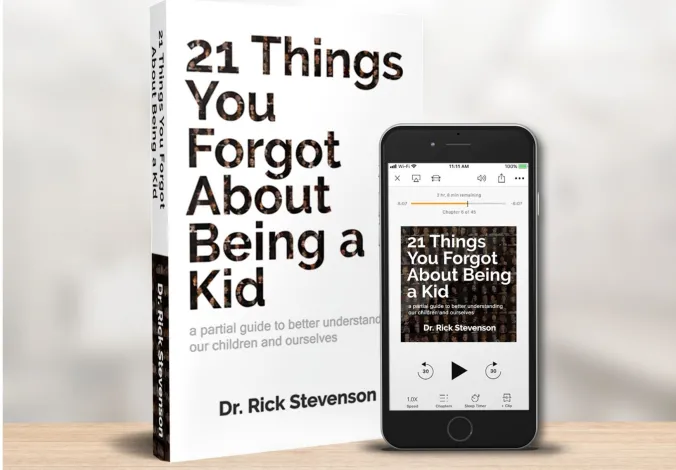
"I taught middle school for thirty years and found my students to be the most challenging, complicated, needy, and yet wonderful of any age. This book is a must-read for a parent, teachers, counselors or anyone working or living with children, especially in the middle school years." Funny, insightful and yet simple. - Reader Reviews
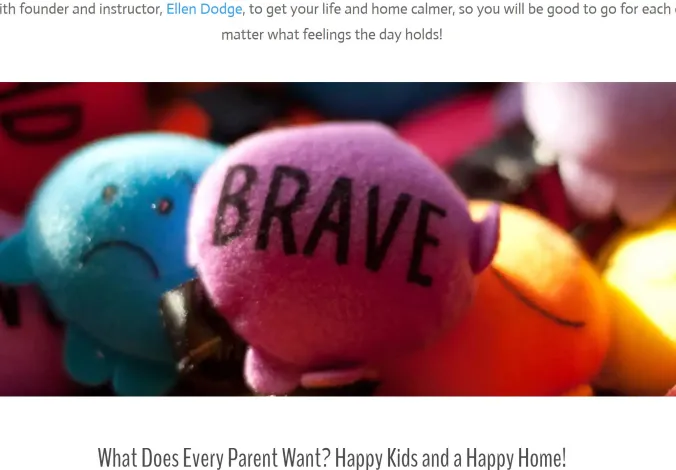
Founder and Instructor, Ellen Dodge M.ED., CCC-SLP, guides you to developing connected and emotionally strong families. In this 7 part series, you can learn how to stop guessing what your child is feeling and stop jumping through hoops to figure out how to help your child express feelings rather than acting out, melting down, or shutting down. Appropriate for up to 12 years of age.
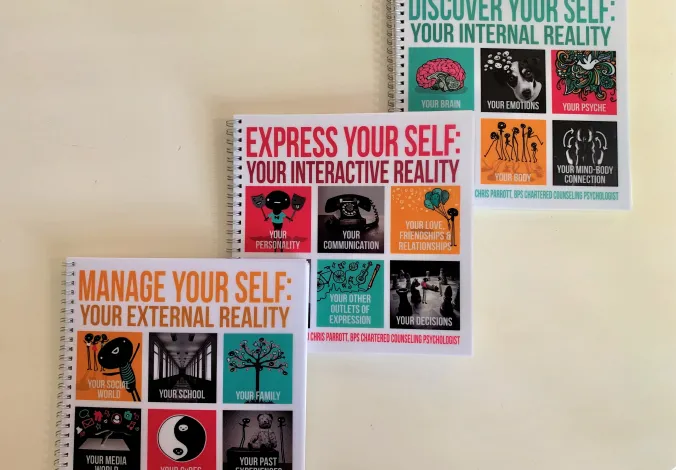
Your Self Series (YSS) is a social emotional learning program for middle and high school students that focuses on the defining issue of these critical years: identity development. Your middle and high school children face complex social pressures, emotional turbulence, mental health issues, and hormonal changes while often struggling to create their academic foundation. These books are a guided masterpiece to helping your child learn to thrive.

This 5-session Master Class gives parents a simple life recipe to increase your child and family’s emotional intelligence so everyone can better manage upset feelings with positivity, while making family life easier and more fun. Ellen is engaging and perfectly imperfect as all parents are. Mother of 3 she teaches that all feelings are ok and all behaviors are not. Learn how to help children manage emotions so that they can "bounce back" as life throws them curves in the road.
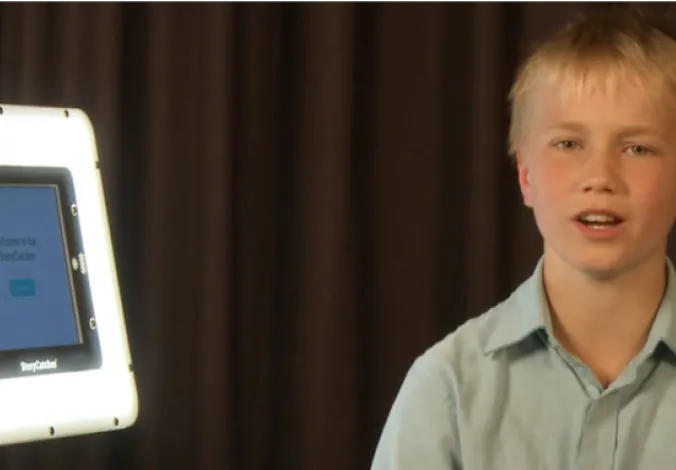
An invitation for one family member under the age of 18 to interact with and give feedback on the new state of the art mental health screener being developed by futuresTHRIVE.
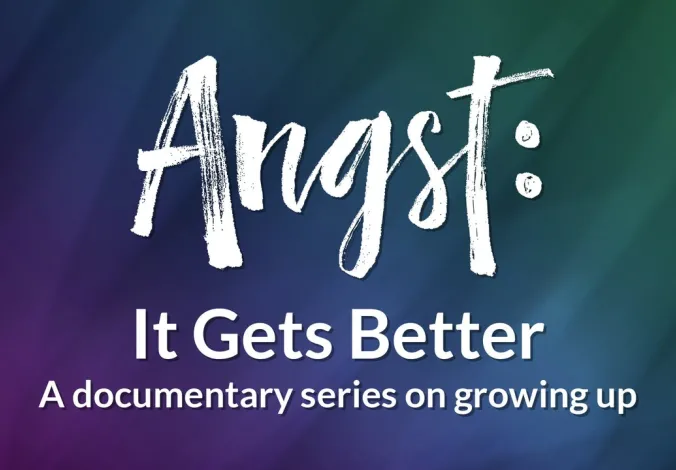
Angst: It Gets Better is a docu-series filmed over the course of 20 years capturing real life stories about growing up. Each episode provides a quick glimpse into the lives of children as they age before our eyes (8yrs-28yrs) sharing their thoughts and feelings on family, relationships, school, religion and life. This is an award-winning IndieFlix Series produced by our team and the founders/producers of The 5000 Days Project.

The struggle is real. Founder Wendy Ward understands. If you want to talk, share, be heard, hear how they go through or just ask questions - you can with this up to 1 hour phone personal call. We do not have to struggle alone.
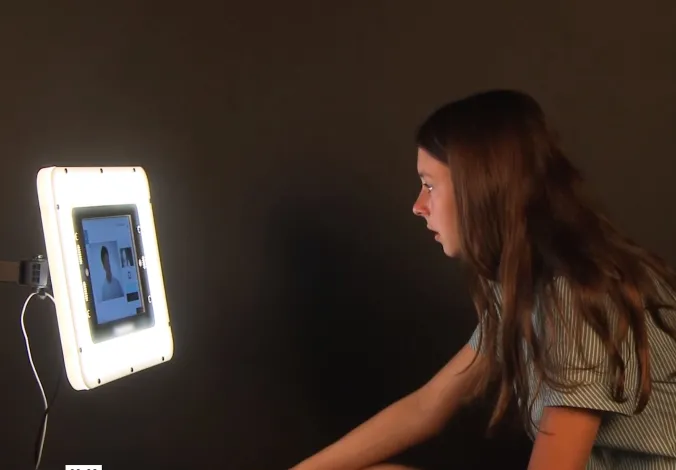
Whole Family
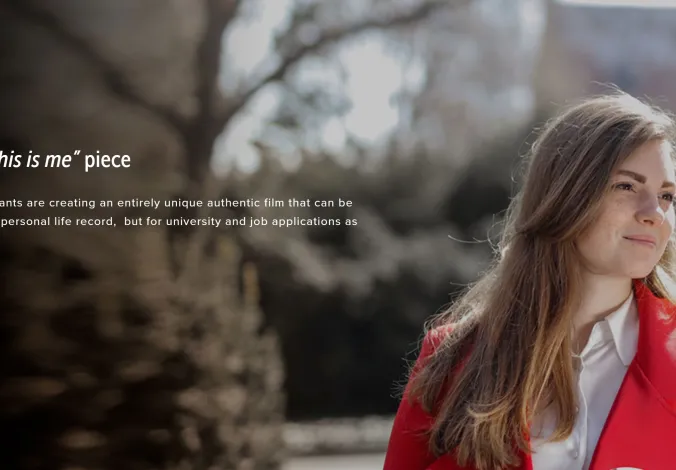
This in-depth private interviewing opportunity will create an authentic video time capsule of growing up for one child. A unique, revolutionary, and science-based method that builds character and Emotional Intelligence while creating a priceless longitudinal personal documentary.
Rewards

Is your table and mealtime talk tired? Spice it up with Chat Mats placemats. You are guaranteed to have a revived dinner conversation and end your meal laughing. Your Self Series is a unique social, emotional and character development program.
Just Because I Care

"I taught middle school for thirty years and found my students to be the most challenging, complicated, needy, and yet wonderful of any age. This book is a must-read for a parent, teachers, counselors or anyone working or living with children, especially in the middle school years." Funny, insightful and yet simple. - Reader Reviews

Founder and Instructor, Ellen Dodge M.ED., CCC-SLP, guides you to developing connected and emotionally strong families. In this 7 part series, you can learn how to stop guessing what your child is feeling and stop jumping through hoops to figure out how to help your child express feelings rather than acting out, melting down, or shutting down. Appropriate for up to 12 years of age.

Your Self Series (YSS) is a social emotional learning program for middle and high school students that focuses on the defining issue of these critical years: identity development. Your middle and high school children face complex social pressures, emotional turbulence, mental health issues, and hormonal changes while often struggling to create their academic foundation. These books are a guided masterpiece to helping your child learn to thrive.

This 5-session Master Class gives parents a simple life recipe to increase your child and family’s emotional intelligence so everyone can better manage upset feelings with positivity, while making family life easier and more fun. Ellen is engaging and perfectly imperfect as all parents are. Mother of 3 she teaches that all feelings are ok and all behaviors are not. Learn how to help children manage emotions so that they can "bounce back" as life throws them curves in the road.

An invitation for one family member under the age of 18 to interact with and give feedback on the new state of the art mental health screener being developed by futuresTHRIVE.

Angst: It Gets Better is a docu-series filmed over the course of 20 years capturing real life stories about growing up. Each episode provides a quick glimpse into the lives of children as they age before our eyes (8yrs-28yrs) sharing their thoughts and feelings on family, relationships, school, religion and life. This is an award-winning IndieFlix Series produced by our team and the founders/producers of The 5000 Days Project.

The struggle is real. Founder Wendy Ward understands. If you want to talk, share, be heard, hear how they go through or just ask questions - you can with this up to 1 hour phone personal call. We do not have to struggle alone.

Whole Family

This in-depth private interviewing opportunity will create an authentic video time capsule of growing up for one child. A unique, revolutionary, and science-based method that builds character and Emotional Intelligence while creating a priceless longitudinal personal documentary.